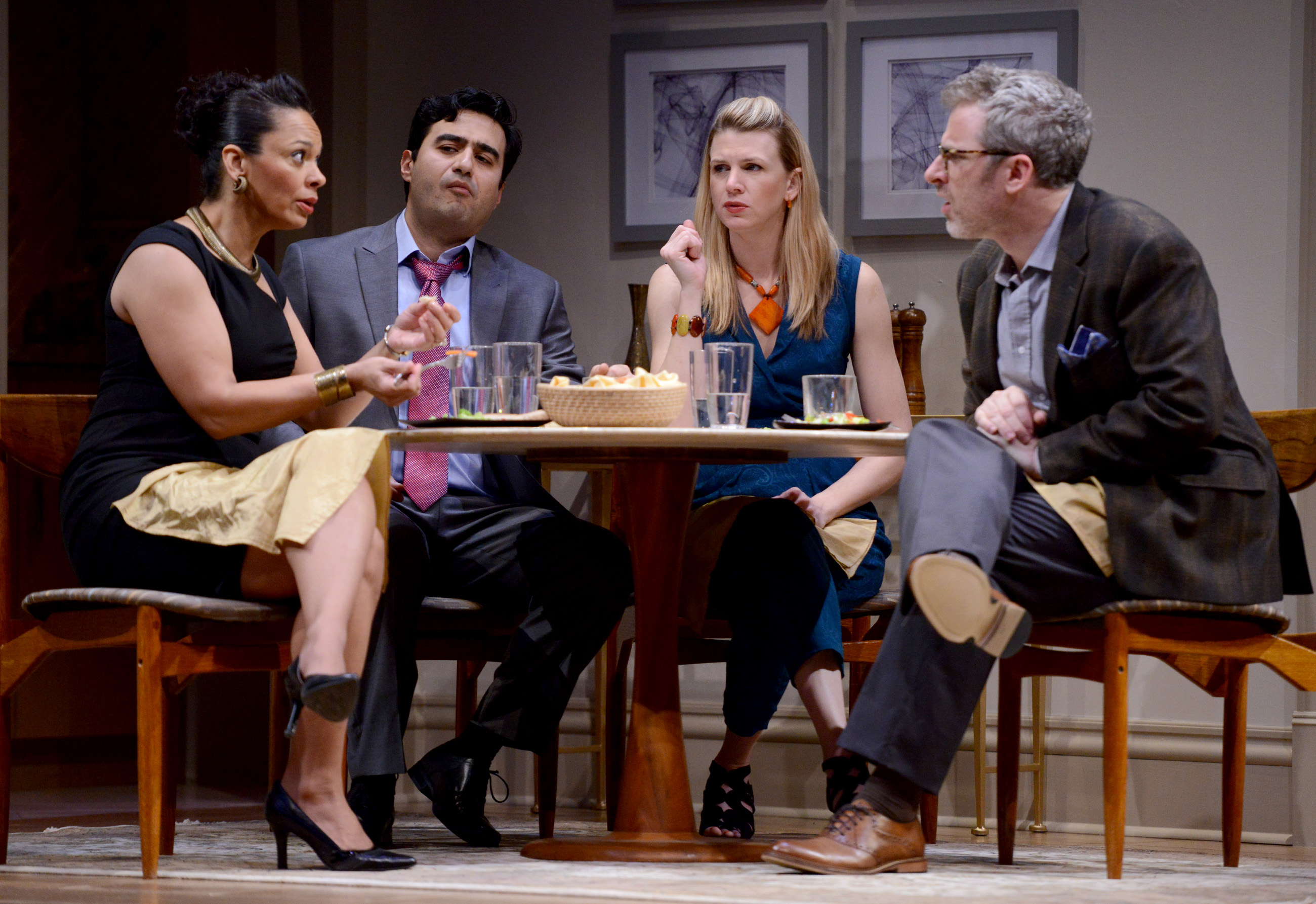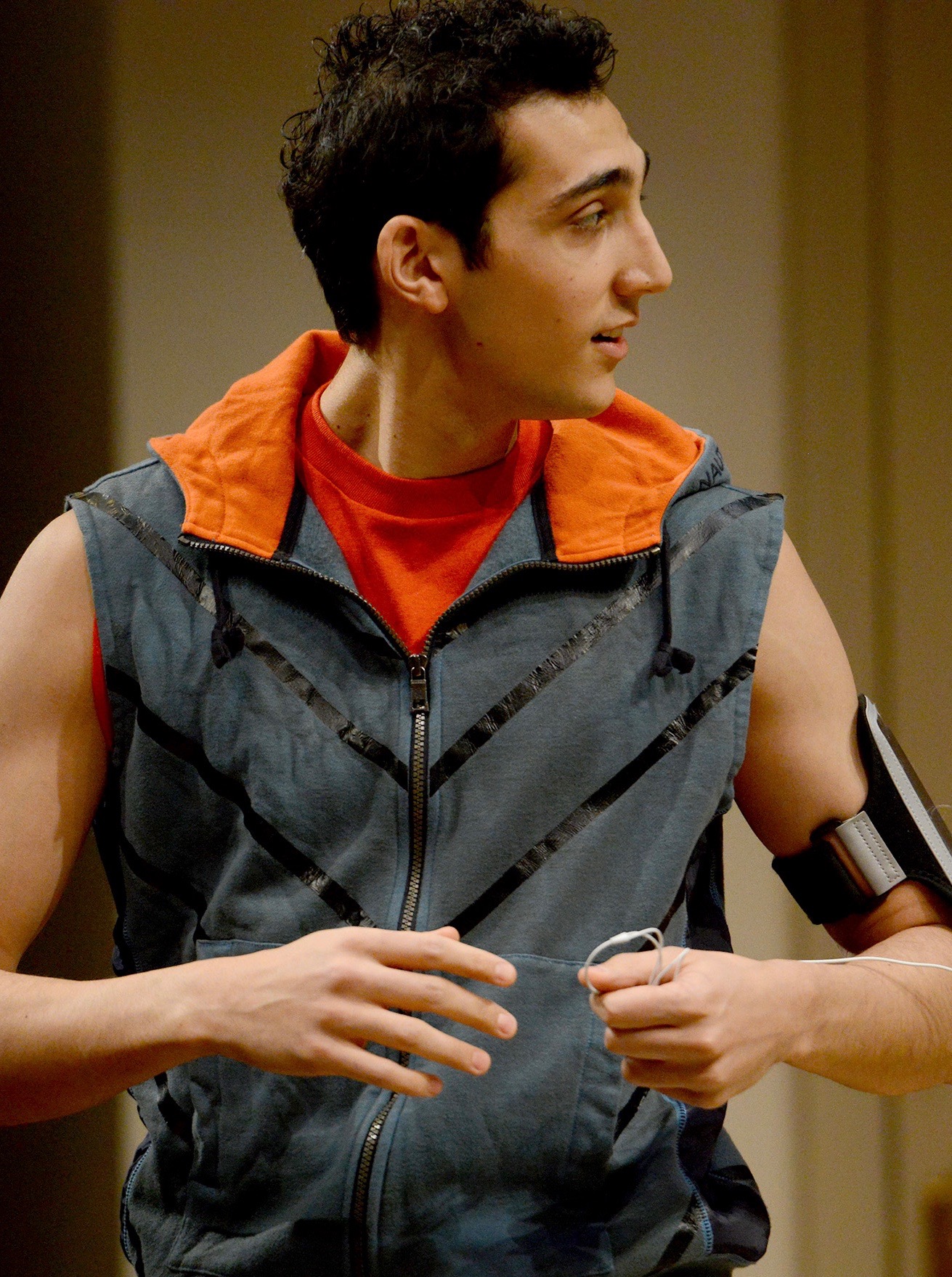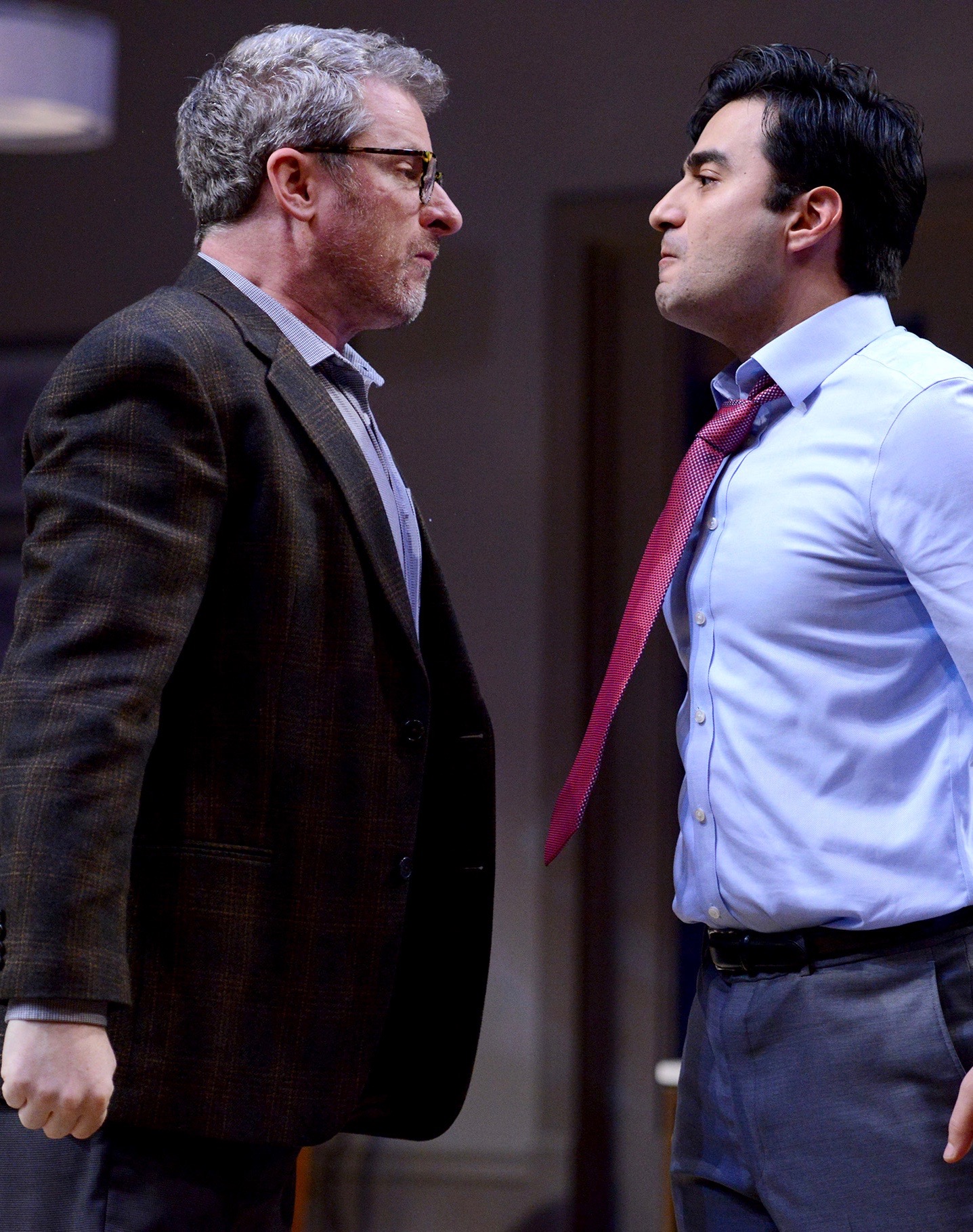‘Disgraced’ Starts Slow, Then Ignites One Heck of a Conversation
- Like
- Digg
- Del
- Tumblr
- VKontakte
- Buffer
- Love This
- Odnoklassniki
- Meneame
- Blogger
- Amazon
- Yahoo Mail
- Gmail
- AOL
- Newsvine
- HackerNews
- Evernote
- MySpace
- Mail.ru
- Viadeo
- Line
- Comments
- Yummly
- SMS
- Viber
- Telegram
- Subscribe
- Skype
- Facebook Messenger
- Kakao
- LiveJournal
- Yammer
- Edgar
- Fintel
- Mix
- Instapaper
- Copy Link

It’s not a real dinner party until the knives come out. Preparing to wrangle, left to right, are Jory (Nafeesa Monroe), hosts Amir and Emily (Fajer Kaisi, Lisa Velten Smith), and Isaac (Ryan McCarthy).
There’s a tremendous scene in Ayad Akhtar’s play Disgraced that is set up like a bad ethnic joke: A Muslim, a Jew, a black woman, and a blonde get together for dinner. What transpires at this gathering is no joke at all, but it sure is high drama.
Disgraced, now being staged by Pittsburgh Public Theater, won the 2013 Pulitzer Prize for Drama. This season, it is the most-frequently produced play by theater companies across the United States—which is hardly surprising, since it is also one of the most socially relevant plays written recently. Disgraced dials the social and interpersonal tensions up to 11 while raising more hot-button issues than you can shake a stick at.
Okay, that sentence is a dreadfully tangled mixture of metaphors. But it speaks to the play’s greatest strength. The characters are more than cardboard cut-outs representing various identity groups and the conflicts between them. Each character, within himself or herself, is a tangled mixture of conflicting identities and desires. Disgraced paints a richly nuanced picture of the nuttiness that can arise in our diverse and highly mobile society.
The play does have some weaknesses. To this reviewer, the chief one is that takes awhile to get things rolling. Don’t expect fireworks from the start. Plot elements need to be put in place and slow-burning fuses lit. Altogether, though, Disgraced isn’t very long: just under an hour and 20 minutes, with no intermission. And once the grand finale begins, it builds to an epic blowout.
Just an Honest Dude, His Earnest Wife, and a Predicament
Disgraced takes place in a spacious apartment on New York’s Upper East Side. The upper-crust couple who inhabit the apartment have furnished it tastefully, and have furnished their lives in layers of ironic contradictions.
Amir (Fajer Kaisi) is a high-level attorney at a corporate law firm. A Pakistani American raised as a Muslim, Amir has firmly rejected his faith, finding it too primitive and crude for anyone as progressively modern as he is—while his wife, the willowy, WASPy blonde Emily (Lisa Velten Smith), has become enthralled with the heritage her husband wants to leave behind.
Emily is an artist. She paints in a style that emulates the motifs of traditional Islamic art. In her travels, she has visited fabled mosques, and she has read the Qur’an—not in order to convert, of course, but for cultural insight and understanding. (She may not be quite liberal enough to make your teeth hurt, but she comes close.)

Amir’s nephew Hussein (Justin Ahdoot), eager to assimilate, calls himself “Abe Jensen.”
Nonetheless, their marriage seems happy, until Amir’s nephew (played by Justin Ahdoot) drops in. Although his birth name is Hussein, he goes by Abe. His dress and manner suggest that he’s on the hip-hop, high-tech fast track to American assimilation … yet Abe wants his Uncle Amir to help with a matter of Islamic concern.
A local imam has been jailed on suspicion of funneling money to jihadi terrorists. Abe and others believe it’s a bogus rap, and even though the imam has a team of defense lawyers, they’re not Muslims. Would Uncle Amir accompany the defendant to court one day, in an unofficial capacity, to lend a bit of progressive-Islamic support to the cause?
Whoa! That pitch doesn’t fall in Amir’s progressive strike zone. Nor will it help his effort to become a law partner. But when idealistic Abe and sympathetic Emily double-team Amir, he relents. And the rest is chaos.
Amir’s court appearance makes the news. Is he in hot water at his firm? No, but he’s getting the cold shoulder after publicly showing support for an alleged criminal preaching a religion that he, Amir, privately believes to be what is bogus about the whole affair.
Distraught as he is, Amir tries to be cheerful when Emily learns that her Islamic-inspired paintings will be included in a major new art exhibit. To celebrate, two guests are coming to dinner: the museum curator, Isaac (Ryan McCarthy), who is Jewish, and his African American wife, Jory (Nafeesa Monroe), a colleague of Amir’s at the firm.
The table is now set for a memorable evening. The fuses are sizzling, and the best part of Disgraced unfolds from this point.
Rockets Launched; Permission Granted!
The grand finale begins with minor eruptions, which are quickly quenched. Then firecrackers start hissing in unexpected places, as facts and events hinted at earlier turn into stunning reveals.

Isaac and Amir prove that you don’t have to be a religious fanatic to hate the other guy.
Also, as cocktail banter turns to sniping, people assert and defend surprising positions, and with surprising ferocity.
It’s not just that the knives are out; inner conflicts are surfacing, too. When people are challenged—when any aspect of their self-identity comes into question—they become radicalized. Not to the extent of joining a militant jihad or counter-jihad, perhaps, but certainly to the point of going off their rockers. No spoilers here. Not even a quote from the dialogue. You’ve got to see it; you’ve got to hear it.
As for the feeling that the play starts slowly: I’m unsure if this is inherent in the script or due to how the production played to the audience on the night I went. It was less than a full house, and until the fireworks commenced, a quiet house. Things that might normally draw waves of laughter drew scarcely a chuckle.
For instance, the play opens with Amir standing in the living room posing for a portrait by Emily. He’s dressed in his fabulously gorgeous designer suit coat, shirt, and tie, but wearing no pants: “I only need you from the waist up,” Emily says. You’d think that would be good for a roar (or at least a healthy, double-entendre giggle), but no.
I wondered if audience members came to the play with a sense of, let’s say, politically correct reverence, which may have suppressed their inclination to laugh at such bits. I also wondered if they might have had trouble sympathizing with the problems of the one-percenters. It can be difficult to empathize with a fabulously wealthy attorney who wants to make partner if your immediate concern is making a mortgage payment.
My advice: If you’re going to Disgraced, go loose. Permission to laugh—even at the over-privileged members of otherwise troubled minority groups—is hereby granted. And when the play turns serious, it will leave you with plenty to talk about. Just try not to go off your rocker.
Closing Credits and Ticket Info
Ayad Akhtar’s Disgraced is directed for Pittsburgh Public Theater by Tracy Brigden. Through April 10 at the O’Reilly Theater, 621 Penn Ave., Cultural District. For showtimes and tickets, visit The Public online or call 412-316-1600.
Photos courtesy of Pittsburgh Public Theater.
Mike Vargo, a Pittsburgh-based writer and editor, covers theater for Entertainment Central.
Share on Social Media
- Like
- Digg
- Del
- Tumblr
- VKontakte
- Buffer
- Love This
- Odnoklassniki
- Meneame
- Blogger
- Amazon
- Yahoo Mail
- Gmail
- AOL
- Newsvine
- HackerNews
- Evernote
- MySpace
- Mail.ru
- Viadeo
- Line
- Comments
- Yummly
- SMS
- Viber
- Telegram
- Subscribe
- Skype
- Facebook Messenger
- Kakao
- LiveJournal
- Yammer
- Edgar
- Fintel
- Mix
- Instapaper
- Copy Link
Follow Entertainment Central
Sign up for the EC Newsletter
Latest Stories







